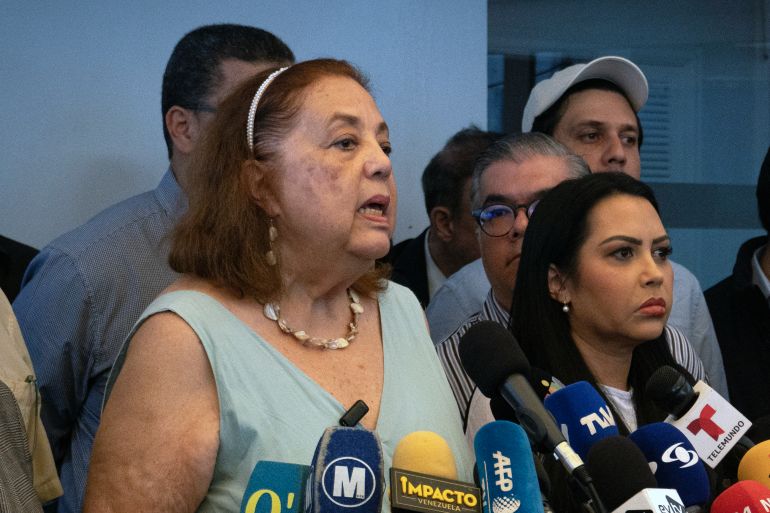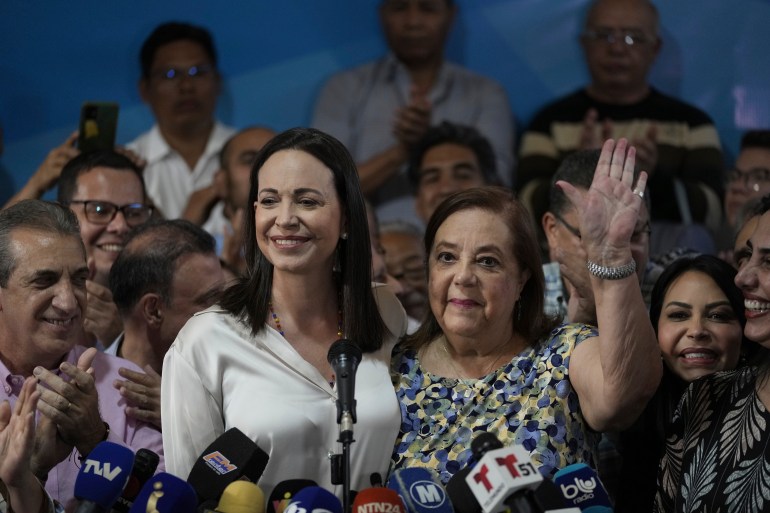Venezuela opposition fails to register candidate for presidential election
Democratic Unitary Platform denounces ‘violation’ of voter rights after being unable to field rival to incumbent Maduro.

Venezuela’s main opposition coalition said it has been blocked from registering its candidate to challenge President Nicolas Maduro in the upcoming elections on July 28.
In a video statement on Tuesday, the Plataforma Unitaria Democratica (PUD) explained it had been unable to formally register its presidential candidate, Corina Yoris, on the electoral authority’s online registration system.
Keep reading
list of 3 itemsMaduro given party nod to run in Venezuelan presidential election
Venezuela sets presidential election for July amid opposition candidate ban
The deadline for registration had been set for midnight, at the end of Monday.
“They haven’t let us get in,” said coalition official Omar Barboza. Calling for the registry to be reopened, he blasted the “violation of the right of the majority of Venezuelans who want to vote for change”.
The announcement renewed criticism of President Maduro and his treatment of political rivals. On Tuesday, countries like Brazil and the United States expressed concern about how the vote would unfold.
Not allowing Yoris to register would “not be compatible with the Barbados Agreement”, the Brazilian government said in a statement, referring to a deal struck in October to have competitive elections in Venezuela.

A surprise candidate
Yoris’s candidacy took the country by surprise. On Friday, opposition leader Maria Corina Machado named the 80-year-old professor and historian as her replacement in the presidential race, as she continued to face a 15-year ban on holding office.
Machado had previously been selected as the PUD candidate in an October opposition primary, winning the nomination by a landslide. An estimated 2.4 million voters defied government threats of criminal prosecution by participating in the primary.
But in January, Venezuela’s Supreme Court upheld the ban against Machado, on grounds she had engaged in corruption while serving as a legislator in the National Assembly.
Yoris, her replacement in the presidential race, is a relative unknown. Until now, her only public political role was helping to organise October’s opposition primary.
But her relative anonymity, squeaky-clean record and grandmotherly air have fast become part of her appeal. She addressed her inability to register for the race in the press conference on Tuesday.
“We’ve exhausted all of the possibilities,” she told reporters. “It’s not just the name of Corina Yoris that is being denied but the name of any citizen that wants to run.”
Landslide primary
Polls suggest that Maduro, a two-term president, would lose by a landslide if Venezuelan voters were given a fair choice.
To date, 10 candidates have registered to compete in the July elections. However, none are viewed as a serious threat to Maduro’s power base.
Despite Yoris’s difficulties, the National Electoral Council announced early on Tuesday that Manuel Rosales, governor of the northwest Zulia state, had officially registered for the election “by automated means”.
Rosales is perceived as less of a threat to Maduro’s reelection prospects.
Representing the centre-left Un Nuevo Tiempo party, Rosales warned that, without his candidacy, voters may be forced to choose whether “to abstain and have Maduro stay there for six more years without doing anything else”.
On Monday, Maduro himself launched his latest presidential campaign, with a rally outside the electoral council’s headquarters.
International reaction
Neither the Venezuelan Ministry of Popular Power for Communication and Information nor the council has commented on Yoris’s eligibility to run.
In a joint statement, Argentina, Costa Rica, Ecuador, Guatemala, Paraguay, Peru and Uruguay expressed concern over the PUD candidate’s inability to register.
The White House, meanwhile, told reporters that the US was “committed to maintaining sanctions relief” for Venezuela — so long as it follows through with its commitment to free and fair elections.
“It is critical that the Maduro regime recognise and respect the right of all candidates to run,” White House spokesperson Karine Jean-Pierre told reporters.
Maduro has been alternately negotiating and reneging on electoral guarantees promised to the US in exchange for relief from oil sanctions.
Two people close to Machado were arrested last week, causing an outcry from Washington, which has already warned it will allow oil sanction relaxations to expire in April if Caracas does not allow free and fair elections.
For her part, Machado reaffirmed her support for Yoris on Tuesday: “My candidate is still Corina Yoris.”
“What we warned about for many months ended up happening,” she told a press conference. “The regime chose its candidates.”